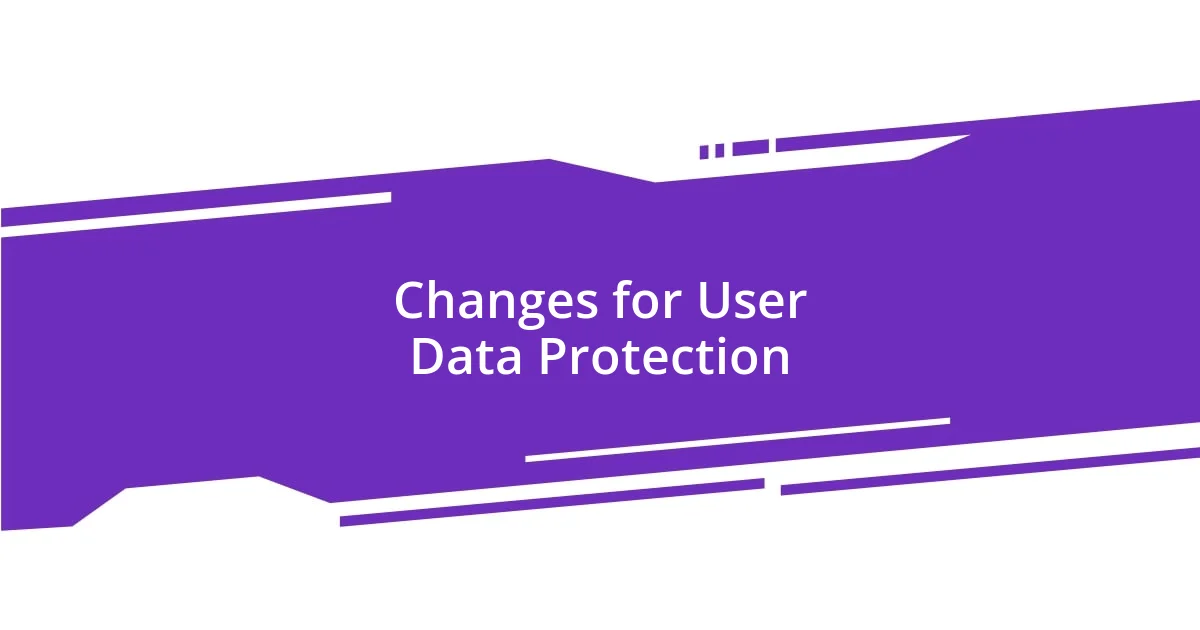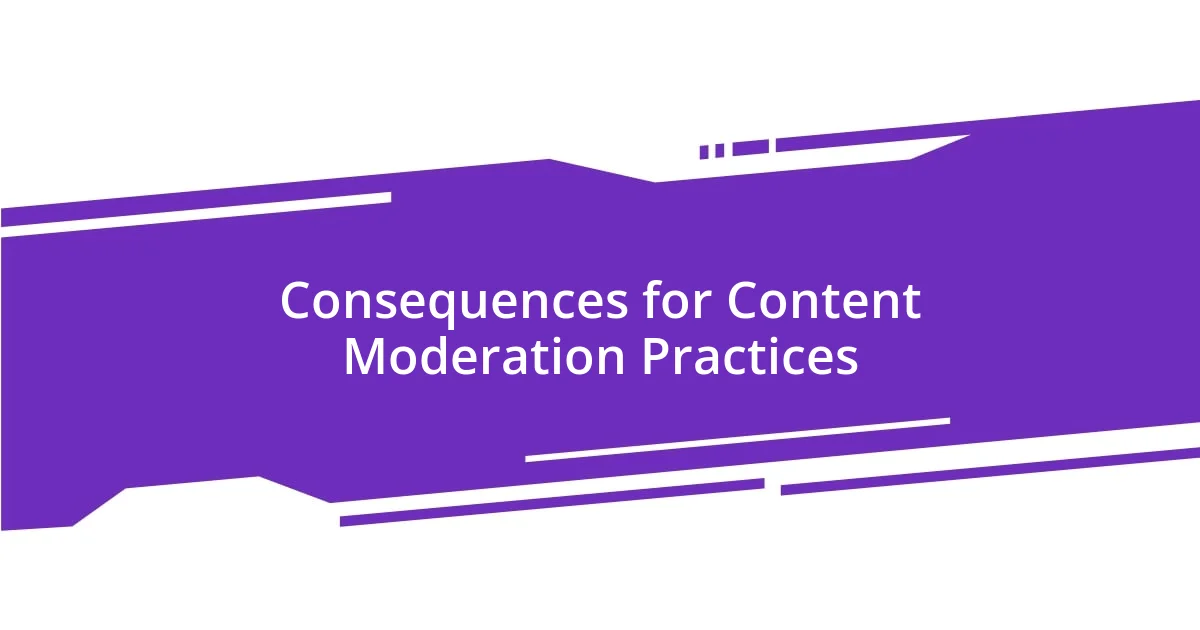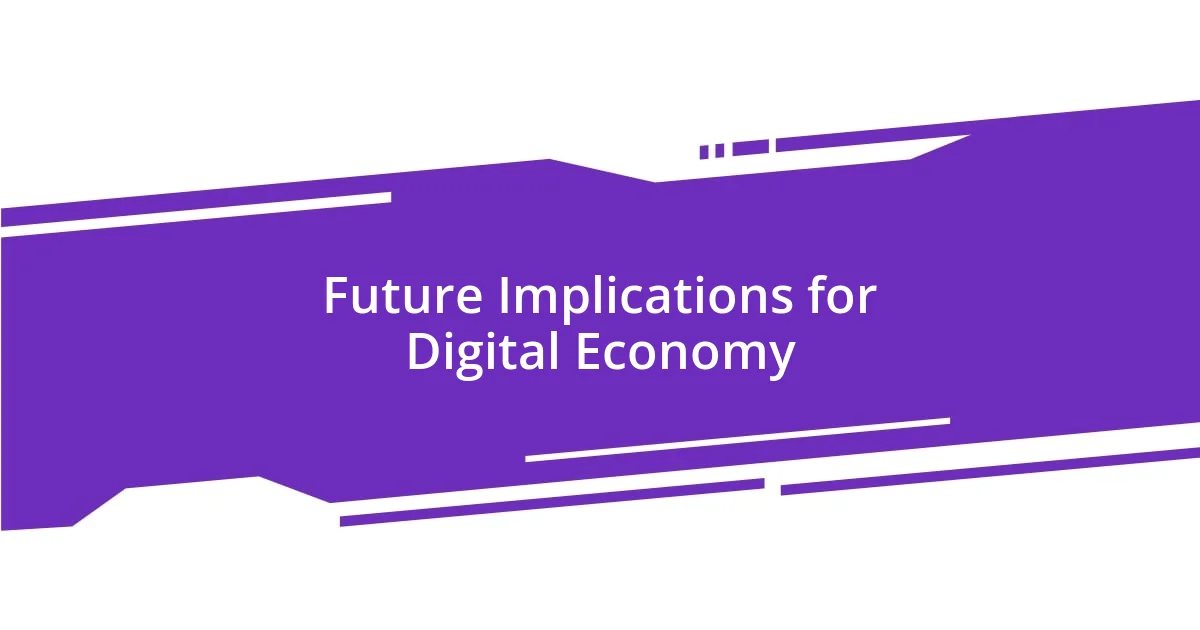Key takeaways:
- The EU Digital Services Act (DSA) enhances user data protection, requiring greater consent and transparency from companies regarding data collection and usage.
- Content moderation practices will become more accountable and efficient, with platforms required to quickly remove harmful content and develop standardized protocols.
- The DSA has the potential to level the playing field for smaller companies, encouraging competition and fostering innovation in the digital economy by prioritizing user welfare.

Changes for User Data Protection
With the introduction of the EU Digital Services Act (DSA), user data protection is stepping into a new era. I can’t help but feel a sense of relief knowing that there are now stricter rules in place to safeguard our personal information. Remember those days when clicking “Accept” on cookie banners felt more like an obligation than a choice? It wasn’t just a mundane task; it was a signal that our data was at risk.
The DSA elevates the conversation around consent and transparency. It’s like finally having a clear window into how our data is collected and used. I recall a time when I stumbled upon a shocking revelation of how much data a single app was harvesting—data I didn’t even realize I’d shared. Wouldn’t it be great if all technology users could have that kind of clarity?
Moreover, the emphasis on users’ rights under the DSA encourages companies to take accountability seriously. It is empowering to know that we, as consumers, now have more control and can hold companies responsible for mishaps. Just last week, I felt grateful when a platform notified me about a data breach, allowing me to take swift action. Isn’t it reassuring to think we might be moving toward a future where our data truly belongs to us?

Consequences for Content Moderation Practices
When it comes to content moderation practices, the EU Digital Services Act brings about a significant shift in how platforms operate. I find it interesting that companies are now under immense pressure to not only monitor user-generated content but also to act swiftly on potentially harmful material. This feels like a crucial step toward a safer online environment, as I’ve often encountered disturbing posts that linger far too long before being addressed.
Here are some potential impacts of the DSA on content moderation practices:
- Increased accountability: Platforms must now justify their content moderation decisions, which could lead to a more transparent process.
- Timely removals: With strict timelines for moderating harmful content, users are likely to see quicker action taken, ultimately improving their online experience.
- Standardized protocols: The DSA may push companies to develop uniform guidelines across platforms, making it easier for users to understand what is and isn’t acceptable.
- Enhanced user reporting: I believe users will feel empowered to report harmful content, knowing that their concerns are now recognized by law.
- Challenges for smaller platforms: I empathize with smaller companies that might struggle to comply with these enhanced requirements, potentially affecting diversity in the online ecosystem.
Navigating this new landscape won’t be easy, but I can’t help but feel hopeful about the positive changes that lie ahead for content moderation practices.

Future Implications for Digital Economy
The future implications of the EU Digital Services Act on the digital economy are vast and multifaceted. Personally, I believe this legislation might level the playing field for smaller companies by allowing them more access to user trust. Think about it: when consumers feel safer, they are more likely to explore new platforms and services rather than sticking to the familiar giants. Isn’t it exciting to envision a scenario where innovation springs from unexpected corners of the digital landscape?
Additionally, the DSA could redefine how major tech companies do business. I often wonder if we’ll see a shift in their operational philosophies—from chasing immediate profits to prioritizing user welfare. This might transform not just market dynamics but also the way these companies engage with their users. Reflecting on my experiences, I can already see a shift where platforms that prioritize user-friendly policies and transparency could attract a more loyal customer base, ultimately reshaping their bottom lines.
Moreover, I can’t shake the feeling that the DSA will encourage an era of enhanced competition. With user rights front and center, companies will need to look beyond basic compliance and start innovating ways to genuinely improve user experiences. I can envision companies investing in better user interfaces and customer support, and creating environments where users feel respected and valued. Will we soon find ourselves in a digital economy that places ethical considerations at the forefront of business strategies? I certainly hope so!














